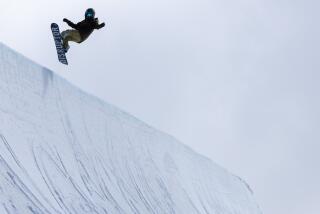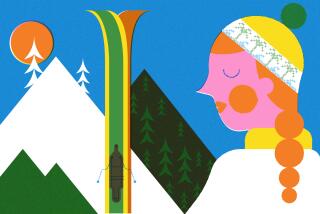Price for a Lift Uphill Rises, but Skiers Still Want to Go Downhill
- Share via
SUN VALLEY, Idaho — Downhill skiing is not for the faint of heart or light of wallet. And costs are rising, largely because of big injury suits and sky-high rates for liability insurance.
The sport is inherently pricey: buying the basic equipment to transport one’s self down a snowy mountain can cost $500-$700 for skis, boots, bindings and poles.
But that’s before skis touch snow. The real wallet-emptier is the lift ticket, which buys passage up the mountain so the skier can risk life and limb getting back down. Daily tickets range from $11 to $27 around the country, with an average of $18.50. A weekend of skiing for a family of four, without calculating accommodations, meals or extensive travel, can cost $200 just for the lifts and lunchtime snacks.
This year’s lift tickets are priced at least $2 above last year’s to make up part of the drastic increases in insurance rates, ranging from 50% to 350% in the last few years. Some resorts have been forced out of business, like Iron Mountain near Lake Tahoe in California.
The insurance premium for Squaw Valley tripled this season to $910,000. Lift tickets went to $27 from $24 last year.
At Hunter Mountain, New York’s largest private ski area, general manager Orville Slutzky said he faced $1.5 million in premium payments for a “fraction” of his previous coverage. Last year, he paid a premium of $528,000.
“I should have put the key in the door and walked away,” Slutzky said. “But there’s a moral obligation to all the supporting businesses around here. There’s a moral obligation to the work force here, too. If we close, 600 people are out of work.”
Premiums are going up for many businesses around the country, and the insurance industry blames the trend toward litigation. That is true in the ski industry, where lawsuits are increasingly common and injured skiers are winning higher awards, from an average of $345,000 in 1974 to $1.07 million last year, according to the National Ski Areas Assn. (NSAA).
Several lawsuits are pending in a Dec. 14 chairlift accident at the Keystone ski area in Colorado, which injured 49 skiers, 29 of whom were hospitalized.
The lift has reopened, but Gary Stoll, vice president of Lift Engineering in Carson City, Nev., which manufactured the Keystone lift, said insurance companies have since canceled policies with all makers of ski-lift equipment.
As the sport grows more popular and the mountains get more crowded, skier safety has become more important. Resort operators are going out of their way to educate the reckless few, NSAA spokeswoman Kathe Dillmann said.
This winter, four people have died in skiing accidents at Killington and Mt. Snow in Vermont.
“A lot of skiers don’t even realize they’re out of control,” Dillmann said. “They’re just out there having a good time and don’t realize the consequences.”
More to Read
Sign up for The Wild
We’ll help you find the best places to hike, bike and run, as well as the perfect silent spots for meditation and yoga.
You may occasionally receive promotional content from the Los Angeles Times.






